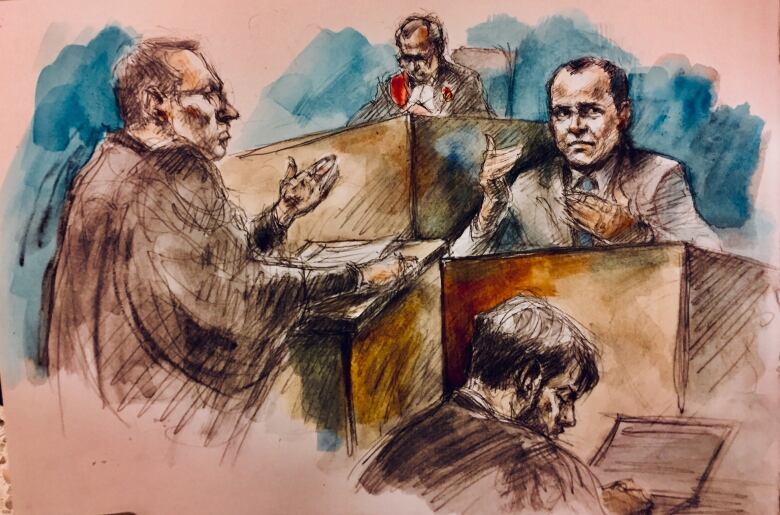Paid for 6 years while suspended, corrupt cop Ruthowsky could be cut off Friday
Const. Craig Ruthowsky was found guilty of corruption charges last month, but he's still getting paid

After six years of beingpaid while suspended, veteran Hamilton cop Craig Ruthowsky's paycheques may finally dry up Friday when his sentencing hearing happens in a Toronto courtroom.
The 44-year-old was convicted on charges of bribery, obstruction of justice, breach of trust and cocaine trafficking in Superior Court in Toronto late last month.
If his sentence includes a jail term, that is a trigger that would allow Hamilton police to stop paying him.
He was actually suspendedback in June of 2012 but he's been collecting cheques from the public purse ever since.
During three of those years, Ruthowsky even popped up on The Sunshine List, which tracks the province's highest paid public sector earners, making over $104,000 last year, over $107,000 in 2015, and over $109,000 in 2012.
Even though Ruthowsky was facing corruption charges, Hamilton police were still mandated to pay him because of legislation in the Police Services Act.
The act says that it's only when an officer is "convicted of an offence and sentenced to a term of imprisonment," that the chief of police or a city's police board can cut off his pay.
The Crown has said it is seeking jail time for Ruthowsky's sentence. He was convicted by a jury who heard testimony from drug dealers who said that Ruthowskywas running a pay for protection scheme so they could sell drugs in Hamilton without fear.

Police board head calls it 'unacceptable to taxpayers'
There certainly seems to be an appetite to stop Ruthowsky's pay. Coun. Lloyd Ferguson, who heads up the city's police board, called him the "poster child of suspension without pay" in a previous interview, and said his payouts were "unacceptable to taxpayers."
Police act legislation also dictates that the decision to suspend a cop without pay can be upheld even if a conviction or sentence is under appeal, which isan important distinction, if Ruthowsky decides to appeal his sentence.
But before sentencing can even take place, lawyers on both sides will argue Friday over a stay in proceedings brought forward by Ruthowsky's lawyers, which is an order preventing either temporarily or permanently any further action on a prosecution.
The crux of their argument is that Ruthowsky had an unfair trial because a lead investigator on his case is married to a woman he once dated.
Cases like Ruthowsky's where an officer is paid for over half a decade while on suspension could soon be a thing of the past.
Ontario is making sweeping changes to its policing laws, including strengthening oversight of the system and making it possible to suspend officers without pay.
Suspended cops collect millions each year
The changes, contained in legislation introduced last November, would include the first update to the Police Services Act in more than 25 years.
The new legislation proposes to allow police chiefs to suspend officers without pay in certain circumstances a power chiefs have been requesting for a decade.
Ontario is currently the only province in which chiefs can't revoke the pay of suspended officers, who collect millions of dollars in public funds each year.
The new legislation proposes to allow suspensions without pay when an officer is in custody or when they are charged with a serious federal offence that wasn't allegedly committed in the course of their duties.
But if an officer wants to fight that, the matter would go to adisciplinary tribunal, which would make the final decision.
If the officer is ultimately found not guilty of the charge he or she wasfacing, theywould be reimbursed for the lost pay.
With files from the Canadian Press












_(720p).jpg)


 OFFICIAL HD MUSIC VIDEO.jpg)
.jpg)



























































































